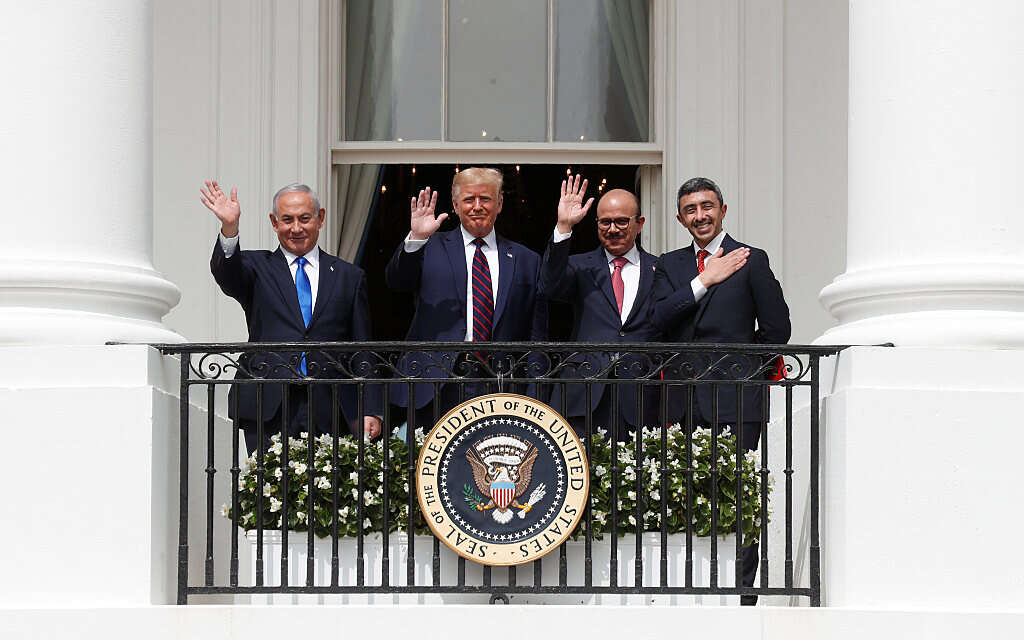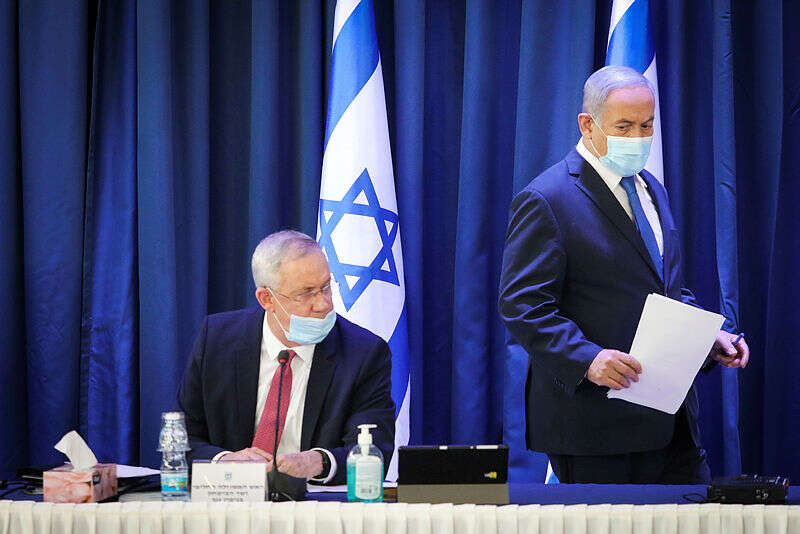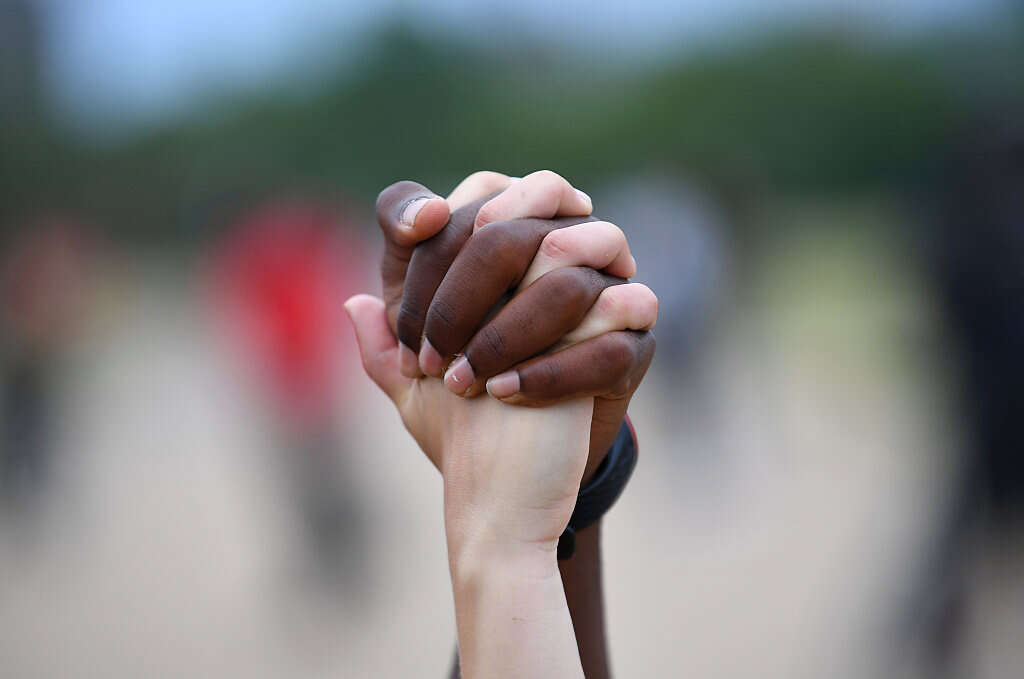The past year will go down in history as one of the most tumultuous periods in human history. The once-in-a-century COVID-19 outbreak that began racing worldwide in early 2020 has now infected upward of 80 million people and has so far left over 1,750,000 dead. As if that wasn't gruesome enough, the outbreak crippled international travel, rattled the world economy, and saw the most vibrant urban centers become virtual ghost towns as nearly all governments declared unprecedented lockdowns.
Follow Israel Hayom on Facebook and Twitter
World powers raced to find a vaccine for COVID-19, with the US, UK, Russia and China all speeding through research and clinical trials to come up with immunizations by December, giving humanity a true fighting chance against the deadly virus.

Like all countries, Israel has also been grappling with the pandemic. Widely lauded for its ability to curb the first coronavirus outbreak, Israel is now fighting a third resurgence, but is able to boast one of the highest vaccination rates in the world.
The World Health Organization has warned that despite the vaccine, COVID-19 is here to stay. With evidence that the virus has already started mutating, this ominous prediction is likely right on point.
In the global cyclone of events caused by the pandemic, most other world events have been pushed aside, but this year saw other major developments as well, especially in the Middle East.
Between September and December, after years of behind-the-scenes negotiations and with the administration of US President Donald Trump leading negotiations, the Middle East peace process experienced huge strides.
On Sept. 15, a new era of regional stability emerged as the United Arab Emirates and Bahrain have broken the longstanding taboo on recognizing Israel and have joined it in signing the Abraham Accords – the first Middle East peace accords inked in 25 years and the first between the Jewish state and Arab Gulf kingdoms.
Sudan was next to announce the normalization of ties with Israel in late October, and Morocco followed suit in early December. The decision by both further signaled the fact that Arab leaders were slowly adopting a shift in their approach to maintaining ties with Israel.
US and Israeli officials both have hinted that a fifth Arab country may soon join the accords, sparking speculations that Oman and Saudi Arabia could be next to recognize Israel.

With Iran emerging as a regional and global threat over its aspirations of Middle East hegemony and nuclear weapons program, Gulf leaders have come to see Israel as a strategic ally in the efforts to curb the world's chief state-sponsor of terrorism.
Tehran, the main proxy of which in the region is the Lebanon-based Hezbollah, has been increasingly involved in Syria since the civil war in the country erupted in 2011, sending allied militias weapons and deploying Revolutionary Guards personnel to assist Syrian President Bashar Assad's remain in power.
Israel has repeatedly stated that it will not allow Iran to gain a military foothold near its northern borders and has mounted hundreds of strikes against IRGC infrastructure in Syria.
Iran has also accused Israel – long suspected of killing several Iranian nuclear scientists a decade ago – of the Nov. 27 assassination of Mohsen Fakhrizadeh, who was seen by Western intelligence services as the mastermind of the county's covert nuclear weapons program.
This was another in a series of major blows to Iran in 2020, which began with the elimination of Quds Force commander Gen. Qassem Soleimani in a US drone strike in Iraq on Jan. 3, and also included a host of mysterious incidents, from cyberattacks to explosions, in its nuclear sites.
In another major defense move in 2020, Israel officially announced a shift in its security policy toward Lebanon, saying it will hold Beirut responsible for any attempt by Hezbollah to harm Israeli soldiers or civilians.
After years when Israel opted to contain provocations by the Iranian-backed terrorist group, Defense Minister Benny Gantz ordered the IDF to prepare a host of response scenarios for a conflict with Hezbollah.

The move has put the northern sector as a whole on alert, as most defense experts believe that the next conflict along Israel's northern borders will include both Lebanon and Syria. Israel has stated that it has no interest in a flare-up in the sector but the military has stressed that it will not allow enemy entities to harm Israeli civilians or soldiers and will hold Beirut and Damascus responsible for any such incident.
These major shifts have taken place against the backdrop of equally tumultuous domestic politics. In March 2020, following three election campaigns in under 18 months, Likud and Blue and White parties were able to cobble together a national unity government, declaring they will put their differences aside to see Israel through the coronavirus crisis.
Political tensions, however, erupted almost immediately, as many Likud lawmakers felt snubbed by the unity deal, which saw Blue and White receive control of the high-profile Defense, Foreign and Justice ministries, as well as a rotation agreement that was to see Gantz become prime minister in November of 2021.
The growing friction hobbled the coalition's work from day one, with senior posts left unmanned, and IDF's workplace becoming stuck in its tracks and – in what proved to be the fatal blow – prevented the coalition from passing a state budget.
Time ran out on Dec. 23, when Likud and Blue and White were unable to present a budget for the parliament to vote on. With no hope of again postponing the vote on the budget bill, the 23 Knesset ended its term on the stroke of midnight – a mere nine months after being sworn in – plunging Israel into its fourth elections in two years.

One ray of light came on Dec. 30 when, after 30 years in prison, Jonathan Pollard and his wife Esther landed in Israel, ending decades of attempts by all governments to allow him to come home.
The quakes rattling Israeli politics took place as the country – and the rest of the world – brace for a change in the leadership of the world's No. 1 superpower.
Global pandemic aside, the 2020 news cycle was dominated by the presidential race in the United States, in which former US Vice President Joe Biden challenged incumbent President Donald Trump.
The American elections, like most other major global events, had to conform to the new rules dictated by COVID-19. Biden's campaign proved sluggish, while Trump stormed election rallies with full force, despite contracting COVID-19 midway through the campaign.
Polls remained consistently in favor of Biden as the world counted down to the Nov. 3 presidential election. Americans broke a 120-year-old voter turnout record, placing Trump and Biden in a neck-and-neck race, the results of which took days to come in, with the Democratic candidate emerging as the winner.
Trump challenged Biden's victory in several states but to no avail. US President-elect Joe Biden will be sworn into office on Jan. 20.
Elsewhere in the world political tensions sparked military conflicts.
On Sep. 27, 2020, explosions rocked Nagorno-Karabakh, a small, mountainous region in the Caucasus, between Europe and Asia.
The area has been at the center of a conflict between Armenia and Azerbaijan for more than 30 years but the two-month of fighting in 2020 claimed thousands of lives, primarily soldiers, but also over 100 civilians. A ceasefire agreement was brokered on Nov. 10, by which most of the territories lost by Azerbaijan during the First Nagorno-Karabakh war were returned to it.
Over in the United States, the police-involved killings of George Floyd, Ahmaud Arbery, and Breonna Taylor sparked a wave of protests – mostly peaceful but some shockingly violent, that gave rise to the Black Lives Matter movement.
The demonstrations were echoed in many countries with a demand to end police brutality and racial injustice.

With the resurgence of Black Lives Matter in national headlines amid global protests, BLM saw an increase in support in 2020, and protests led the movement throughout the summer eventually developed into one of the larger movements in US history.
This year also saw Australia experience its worst bushfire season in decades, which took a devastating toll on people and the environment alike.
The fires burnt an estimated 46 million acres of land, destroyed over 5,900 buildings, including 2,779 homes, and killed 34 people. Nearly three billion terrestrial vertebrates alone – the vast majority of them reptiles – were affected and some endangered species were believed to be driven to extinction.
Smoke from the fires had moved approximately 11,000 kilometers (6,800 miles) across the South Pacific Ocean to Chile and Argentina. NASA estimated that 306 million tons of CO2 had been emitted.

As if the global pandemic and uncontrollable wildfires were not enough, 2020 dealt a serious blow to environmental conservation efforts. The International Union for Conservation of Nature's annual report found 31 animal and plant species have become extinct this year. The IUCN has also placed over 100,000 species of plants and animals on its list of those now threatened with extinction.
The Jewish world was also affected by the global pandemic, as the virus took a heavy toll on densely populated ultra-Orthodox communities. Worse, the pandemic gave way to anti-Semitic conspiracy theories blaming Jews for the spread of the virus and raising concerns that a spike in anti-Semitic attacks would follow.
The global Jewish community saw several other major events in 2020, including the deaths of several renowned rabbis: Talmud scholar Rabbi Adin Steinsaltz, who dedicated 45 years to translating the vast, 1,500-year-old Aramaic tome into modern Hebrew with a running commentary; Former UK Chief Rabbi Jonathan Sacks, who passed away about a month after being diagnosed with cancer; Rabbi Yaakov Perlow, head of the Novominsker Hasidic dynasty in Brooklyn, who succumbed to the coronavirus at the age of 89, and Rabbi Yeshayahu Heber, the founder of the NGO "Gift of Life," which is responsible for almost 800 altruistic kidney donations in Israel, who died of the coronavirus.
Among the most striking events to affect Jewish communities worldwide were the decisions by Morocco and Dubai to highlight Jewish culture. In the wake of the Abraham Accords, Morocco announced plans to become the first Arab nation to teach Jewish history and culture in schools, while Dubai said it would open its first Hebrew-language institute in early 2021.
Unfortunately, the rift between the ultra-Orthodox establishments in Israel, headed by the Chief Rabbinate, and diaspora Jewry grew wider in 2020, when a number of leading religious Zionist rabbis called for a boycott of Reform Judaism.
"One may certainly love every Jewish person, but that does not mean, heaven forbid, allowing cooperation with representatives of the Reform movement that has taken away the Torah and is even now fighting against everything that is sacred in our country: conversion, the Western Wall, Jewish marriage, and more," they argued.
Religion aside, Israel continued to live up to its reputation as the "startup nation" in 2020, as the high tech industry was able to weather the storm sparked by the coronavirus.
Seeking to again venture into space, the Jewish state announced it would be sending a second Israeli astronaut to the International Space Station. Eytan Stibbe, a former fighter pilot, is slated to take off for the International Space Station in late 2021, where he will spend 200 hours performing experiments using Israeli technology and scientific developments.
Gaining further international recognition, six Israeli inventions – from foldable car seats to low-sugar sugar to 3D surgical devices – made Time Magazine's Best Inventions of 2020 list.

One of the most intriguing innovations to come out of Israel this year had to do with a startup seeking to make meat cultivation independent of climate change and natural resource availability, as well as cruelty-free. Space steaks, anyone?
Another innovation that caught everyone's eye was CorNeat KPro's synthetic cornea, which the company hopes could restore sight to millions around the world.
With the first-in-human implant of the synthetic cornea underway, researchers hope the technology behind it would prove "key to turning the tide on global blindness."
The Israeli high tech industry wasn't the only one to score big in 2020.
While the coronavirus had a crippling effect on sporting events at home and abroad – the Tokyo Olympic Games were postponed, as were most mid-level sporting events, with only major world championships being held in audience-devoid stadiums – Israeli sports marked more than a few achievements.
Up and coming Israeli basketball players Deni Avdija and Yam Madar had a big night during the in 2020 NBA Draft, as The Washington Wizards selected Deni Avdija with the No. 9 overall pick and the Boston Celtics' 47th and final pick Yam Madar.

Israeli athletes had a very successful European championships season: Artem Dolgopyat made history after winning the gold medal for his floor exercise and took the bronze medal for the vault; artistic gymnast Linoy Ashram was crowned world champion in the all-around competition in Kiev; Israel's artistic gymnastics team won the gold in the same event, and the country's sailing team took home multiple medals at the European Sailing Championship in Portugal.
On a different mat, Judoka Peter Paltchik won the gold medal in the under-100 kg division at the European Judo Championships in Prague. The gold was a first for Paltchik, who is considered one of Israel's top athletes and a potential Olympic medalist.
Outside the gym, Guy Niv rode into the history books as the first Israeli to compete in the world's most prestigious cycling race, the Tour de France.
One of the biggest surprises in Israeli sports in 2020 was news that an Emirati investor had purchased a 50% stake in Beitar Jerusalem – an iconic soccer club with a highly problematic reputation and the only Israeli team to never have an Arab player.

Sheikh Kamad bin Khalifa al-Nahyan, a member of the UAE's royal family, pledged to invest $90 million in the club over the next decade, and co-owner Moshe Hogeg has pledged to remove the stain of racism from the team and turn it into a "model of coexistence."
But it wasn't all medals and blue ribbons, as 2020 saw the sports world lose two of its most legendary figures: NBA star Kobe Bryant, who was killed along with his daughter Gianna in a helicopter crash near Calabasas, California; and Argentine soccer icon Diego Maradona, who died of a heart attack two weeks after being released from a Buenos Aires hospital following brain surgery.
The coronavirus pandemic left no stone unturned in 2020, pulling the plug on the global cultural scene as well, as governments worldwide imposed social distancing directives that made holding mass cultural events impossible.
But the show must go on and on it went: with Zoom segments and designer pajamas replacing the red carpet and high fashion, the Emmys, Grammys, Oscars, and Tony awards seemed less glamorous than ever, but fans still got their fix.
Israeli fans were in for a special treat this year: Wonder Woman 1984, starring Gal Gadot, lassoed the highest box-office opening of the face-mask era, earning over $16 million in its debut over Christmas weekend in the US. Over on the small screen, actress Shira Hass' star glowed particularly bright, as the 24-year-old's portrayal of a rebellious Hasidic woman in the Netflix hit Unorthodox, earned her an Emmy nomination as well as a coveted spread in Vogue.
In other lovely news, Israeli model Yael Shelbia was named the most beautiful woman in the world for 2020 by TC Candler magazine.
Royals worldwide also made headlines this year, none more shocking than the Jan. 8 Instagram announcement by Prince Harry and his wife Meghan, the duke and duchess and of Sussex, of their decision to "step back as senior members" of the British royal family. The two said they would be splitting their time between the UK and the United States and that they will become financially independent, to which end they have already inked a multi-year podcast deal with Spotify and a multi-year deal to make TV series, films and children's shows for Netflix. Reports on both said only that the two will receive "an undisclosed sum," but it's safe to say we're talking about millions of dollars – more than enough to keep calm and carry on.
Subscribe to Israel Hayom's daily newsletter and never miss our top stories!
The past year was also not short on blasts from the past, as 2020 had some of the most intriguing archaeological finds in recent years.
A six-year-old Israeli boy touring the northern Negev archaeological site of Kibbutz Re'im in Tel Jemmeh made the discovery of a lifetime when what he thought was a piece of clay turned out to be 3,500 years old.
Another astounding discovery proved that the city of Beersheba, which is home to an emerging tech hub, was also home to one 6,500 years ago.
Archaeologists working on a local dig unearthed a furnace used to process copper believed to be a local invention, meaning Beersheba played an important role in the global metal revolution.
Over in Egypt. authorities discovered 13 sealed coffins in the desert necropolis of Saqqara that date back 2,500 years, and remain miraculously intact after all this time.
The year ended with some truly ancient news when in late December, tools pre-dating modern humans were identified in northern Israel
The oldest tool identified to date, discovered near Haifa, was used some 350,000 years ago. It was discovered at the Tabun Cave on the Carmel, one of the most prominent prehistoric sites in the world.

